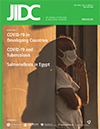Salmonellosis: A food borne zoonotic and public health disease in Egypt
DOI:
https://doi.org/10.3855/jidc.12739Keywords:
Animals, Egypt, Human, Poultry, Public health, Salmonella spp.Abstract
Salmonellosis is an important food borne disease of public health significance. Global estimates of the disease burden shows more than 20 million cases and 0.15 million deaths annually. The disease caused by a variety of Salmonella organisms worldwide. Salmonella pathogens are belonging to family Enterobacteriaceae that are known to infect many hosts inducing variable clinical diseases pictures. Typhoidal and non-typhoidal Salmonellae are common diseases among Egyptians with severe socioeconomic losses. Different species of animals and poultry as well as their products are the main sources and reservoirs for zoonotic human illness. Enteric fever and gastroenteritis are the main clinical manifestations in patients. Great attention toward salmonellosis drug resistance, prevention and control should be considered.
Downloads
Published
How to Cite
Issue
Section
License
Authors who publish with this journal agree to the following terms:
- Authors retain copyright and grant the journal right of first publication with the work simultaneously licensed under a Creative Commons Attribution License that allows others to share the work with an acknowledgement of the work's authorship and initial publication in this journal.
- Authors are able to enter into separate, additional contractual arrangements for the non-exclusive distribution of the journal's published version of the work (e.g., post it to an institutional repository or publish it in a book), with an acknowledgement of its initial publication in this journal.
- Authors are permitted and encouraged to post their work online (e.g., in institutional repositories or on their website) prior to and during the submission process, as it can lead to productive exchanges, as well as earlier and greater citation of published work (See The Effect of Open Access).








